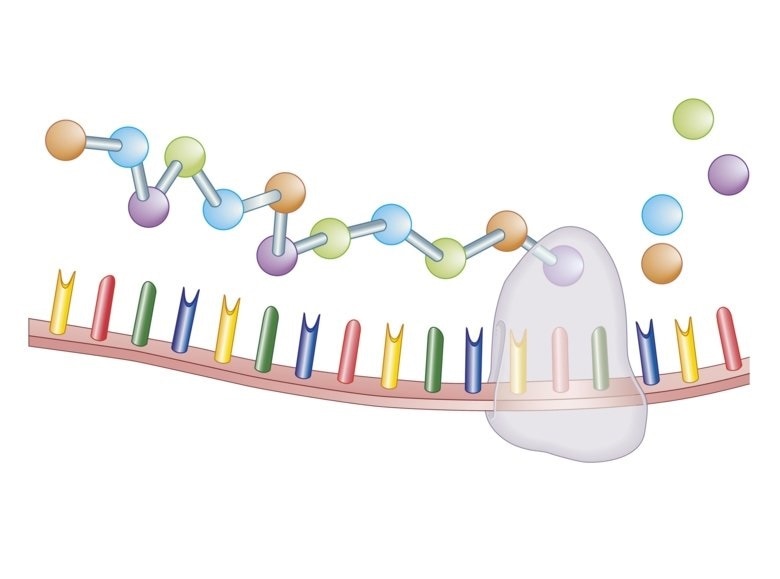Cell growth and division require new proteins and the same applies to cancer cells. Scientists from Karolinska Institutet analyzed the protein eIF4A3 and its role in the growth of cancer cells.

Illustrated cross-section of protein synthesis and ribosome. Image Credit: Getty Images.
The research reveals that by blocking or reducing the production of this protein, other processes arise that result in the cessation of the growth and cell division of cancer cells, eventually causing death. The study has been published in the Science Advances journal.
The body’s normal cell division is closely controlled, and the genes in the cell regulate the start and stop of cell division. At times, this balance is disturbed and leads to the continuous division of cells uninhibitedly. After a while, a small collection of cells evolves—cancer may develop.
When a cell grows, new proteins are produced, among other things, through the translation of the cell's DNA information into mRNA, which forms the basis for the creation of proteins. The cell also needs to manufacture rRNA for the cell’s small factories, the ribosomes, which are responsible for producing proteins.”
Mikael Lindström, Study Co-Author and Associate Professor, Department of Medical Biochemistry and Biophysics, Karolinska Institutet
Mikael Lindström is a member of professor Jiri Bartek’s research group at the Karolinska Institutet. The scientists examined cultured cancer tissue and cancer cells where the eIF4A3 protein’s expression was high compared to normal tissue.
They added synthetically developed small molecules that can be further produced into finished drugs and checked the production of eIF4A3. The scientists detected two distinct changes in the cancer cells.
Firstly, we saw that the blocking of eIF4A3 activated the protein p53, a protein that has an important role to play in fighting cancer cells.”
Dimitris Kanellis, Study First Author and Postdoctoral Fellow, Department of Medical Biochemistry and Biophysics, Karolinska Institutet
Proteins counteract each other
However, one challenge that exists with most tumors is that the positive functions of the p53 protein are counteracted by MDM2, another protein.
Interestingly, we noted that the blocking eIF4A3 also meant that the MDM2 protein changed. This change helps to maintain and strengthen p53 and can be beneficial when we want to inhibit the growth of cancer cells.”
Dimitris Kanellis, Study First Author and Postdoctoral Fellow, Department of Medical Biochemistry and Biophysics, Karolinska Institutet
The findings of the research reveal that inhibition or depletion of eIF4A3 activates p53 and alters the manufacturing process of proteins by disrupting ribosome biogenesis, thereby inhibiting cancer cell growth.
New opportunities for cancer patients
Understanding the significance of the eIF4A3 protein uncovers new possibilities for better and more effective treatment of cancer patients.
“The discovery is very relevant as this type of targeted treatment may represent a new possible approach in chemotherapy, for example in colon cancer where cancer cells often have a high level of ribosomes and rapid growth,” states Mikael Lindström and professor Jiri Bartek, Study Corresponding Authors.
They further added, “Another example is a sarcoma, cancer of the body's support tissues, where we know that sometimes there is an overproduction of MDM2. This increases the chances of more effective treatment.”
The research results offer a significant foundation for further studies. As the research was performed in cultured cancer cells and clinical tumor material, it is yet unclear how blocking of eIF4A3 will affect the growth of cancer in vivo.
“There may also be synergies between the chemical compounds that block eIF4A3 and drugs that are already used to treat cancer that we will now research further,” added Mikael Lindström.
Source:
Journal reference:
Kanellis, D. C., et al. (2021) The exon-junction complex helicase eIF4A3 controls cell fate via coordinated regulation of ribosome biogenesis and translational output. Science Advances. doi.org/10.1126/sciadv.abf7561.